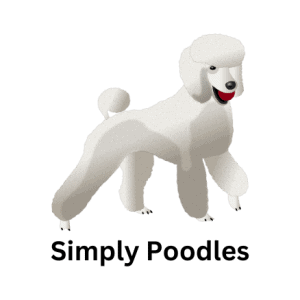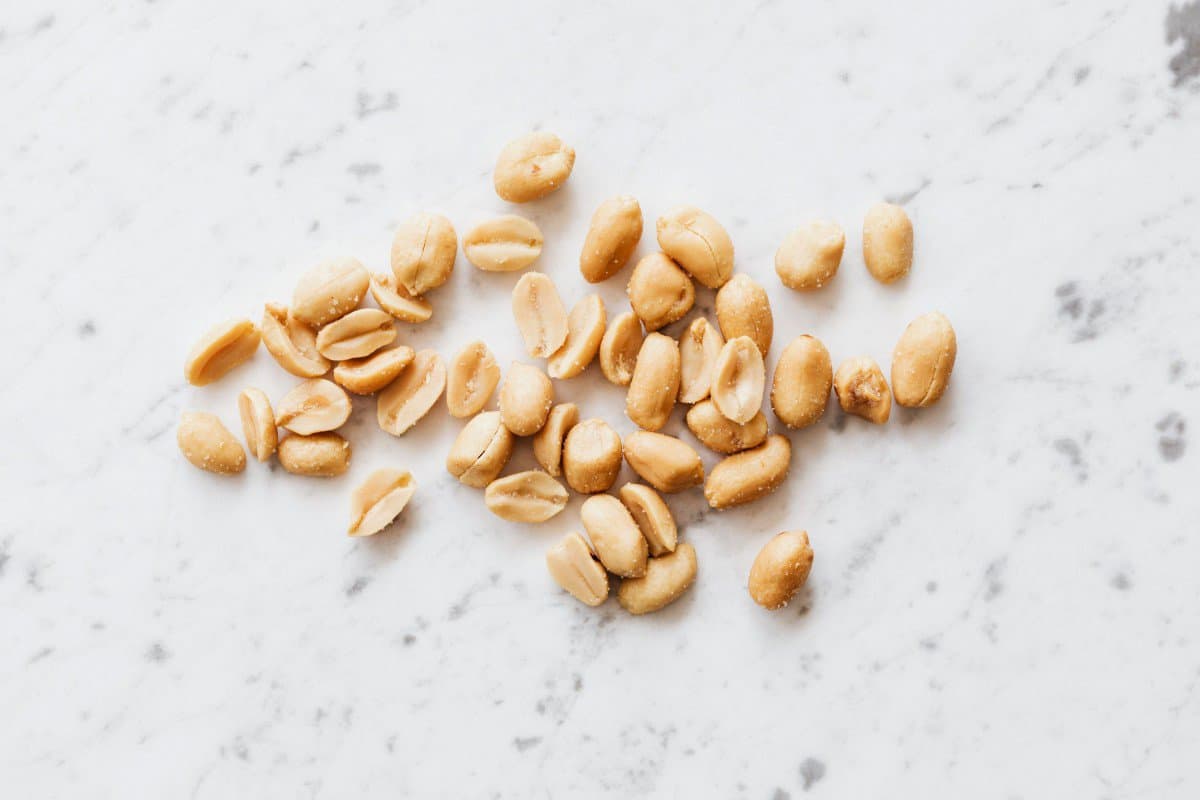Maybe you love to eat peanuts, I know my family loves to eat peanuts! What about my dog? Can my dog eat peanuts? Can your dog eat peanuts?
Yes, dogs can eat peanuts as long as they are eaten in small quantities! Peanuts need to be out of their shell and can be dry roasted or raw with no salt added. Always check with your veterinarian before feeding your dog something new.
Avoid feeding your dog honey roasted, salted, or other flavored peanuts. In many cases they contain high levels of sugar and salt. They may even contain xylitol which is a sweetener and is toxic to your dog.
Introduce Peanuts Slowly to Your Dog
Start out by feeding your dog a few peanuts and observe him for any signs of an allergic reaction. Just like people, dogs can be allergic to peanuts. If you notice any reaction in your dog be sure to contact your veterinarian immediately.
It is well known that peanuts are a common allergy in humans but actual food allergies are rare in dogs. It’s still advisable to watch for allergic reactions in dogs such as a swollen tongue or face after giving your dog peanuts. Other allergic reactions may include diarrhea, vomiting, or itchiness.
There Are Four Different Types of Peanuts
When I think of peanuts usually Spanish peanuts come to mind. Research reveals their are actually 4 different types of peanuts. (Reference: GardeningKnowHow.com Types of Peanut Plants)
Runner Peanuts – Mostly grown in Georgia, Alabama and Florida. Georgia produces 40% of the U.S. peanut crop. Runner peanuts are typically used to produce peanut butter – yummy!
Virginia Peanuts – This popular peanut is grown in Virginia, North Carolina and South Carolina. The Virginia peanut is typically the largest nut and is often used as a snacking peanut.
Spanish Peanuts – The delicious Spanish peanuts are primarily grown in Oklahoma and Texas. These are used in candies and also purchased as salted peanuts.
Valencia Peanuts – Valencia peanuts are the sweetest peanuts and are primarily produced in New Mexico.
Peanuts Provide Health Benefits For Dogs
Peanuts actually provide some benefits to your dog including;
- Peanuts lower cholesterol levels and help prevent heart disease
- Peanuts provide a good source of fiber, reducing inflammation throughout the body
- Peanuts are a great source of magnesium, folate, vitamin E, copper, and arginine
(Source: webmd.com – Health Benefits of Peanuts)
What about Peanut Butter? Can Dogs Eat Peanut Butter?
Although most peanut butter is safe for your dog to eat, the one ingredient to avoid is xylitol. Xylitol is a sugar substitute which is used by some peanut manufacturers which is toxic to dogs but safe to humans. Xylitol causes a quick release of insulin in dogs. This rush of insulin causes a fast decrease in blood sugar levels which can be deadly for dogs.
The condition is referred to as hypoglycemia and can happen in as little as 10 to 60 minutes after consuming xylitol. Be sure and check ingredients on the peanut butter before feeding to your dog.
Contact your veterinarian immediately if you think your dog may have consumed xylitol. Symptoms of xylitol poisoning in dogs include seizures, lack of coordination, weakness, or collapse.
(Source: akc.org – Can Dogs Eat Peanut Butter)
Peanuts Are Not Nuts! Peanuts Are Legumes!
Peanuts are legumes making them members of the pea family in spite of the fact that “nut” is in its name. Peanuts are rich in fiber and healthy unsaturated fats plus vitamins and minerals. By avoiding added salt, sugar, and chemicals peanuts can be reasonably healthy for your dog.
Legumes are a group of foods which includes peanuts, peas, lentils, and beans. Legumes are a good source of protein and healthy fibers.
If your dog is swallowing peanuts whole it’s advisable to crush them first as they could create an obstruction in his throat.
(Source: Healthline.com Legumes: Good or Bad?)
Are Some Nuts Bad For Dogs? Avoid These Nuts – Some Are Toxic
AVOID FEEDING THESE NUTS TO YOUR DOG:
| Black Walnuts | Black walnuts are toxic to dogs and can cause vomiting and even neurologic symptoms. |
| Moldy Walnuts | Moldy walnuts are toxic to dogs and can cause seizures and tremors. |
| Macadamia Nuts | Macadamia nuts are very toxic to dogs. They can cause vomiting, tremors, hyperthermia, weakness, and inability to walk. |
| Raw Cashews | Even though raw cashews are not toxic to dogs they should be avoided. Raw cashews are harder for dogs to digest than cooked or roasted nuts and contain compounds that can cause upset stomach. |
| Hickory Nuts | Avoid feeding hickory nuts to your dog as their large size can cause intestinal blockage and they present a choking hazard. |
| Pistachios | Because of their size pistachios can be a choking hazard and can cause intestinal blockages – especially in small dogs. Pistachios can grow mold which can cause damage to a dog’s liver. |
| Almonds | Almonds can present a choking hazard and can cause intestinal blockage, especially in small dogs. Although almonds are not toxic to dogs it is best to avoid them. |
| Pecans | Although pecans are not toxic to dogs, they tend to mold and even not visible these molds can cause seizures and nerve damage to dogs. |
| Brazil Nuts | Brazil nuts are not toxic to dogs but because of their large size they present a choking hazard to dogs and can cause intestinal blockage. |
(Source: preventivevet.com – Safe and Unsafe Nuts and Seeds For Dogs & Cats)
List of Symptoms of Nut Toxicity in Dogs
If your dog exhibits any of the following symptoms after consuming nuts contact your veterinarian immediately:
- Seizures
- Difficulty walking
- Weakness
- Tremors
- Bloody stool similar to black tar
- Orange urine
- Vomiting
- Diarrhea
- Fever
- Bloating
- Rapid heart rate
- Abdominal pain
- Loss of appetite
- Constipation for several days
Conclusion
Dogs can eat peanuts in moderation. The peanuts must be shelled and can be dry roasted or raw. They should be unsalted with no additional additives or sweeteners. Introduce peanuts slowly to your dog.
Regarding peanut butter the primary ingredient to avoid is xylitol which is deadly to dogs. Always check the label first before sharing peanut butter with your dog.
Some nuts are bad for your dog, be sure and refer to the chart above. Check with your veterinarian first before changing your dogs diet and introducing new foods. Thank you for checking in to SimplyPoodles.com and have a great day with your doggies!
Sources:
Petco.com: Can Dogs Eat Peanuts?
GardeningKnowHow.com Types of Peanut Plants
Harvard.edu Legume of the Month: Peanuts
VetHelpDirect.com: Can Dogs Eat Peanuts
Healthline.com Legumes: Good or Bad?
preventivevet.com – Safe and Unsafe Nuts and Seeds For Dogs & Cats

